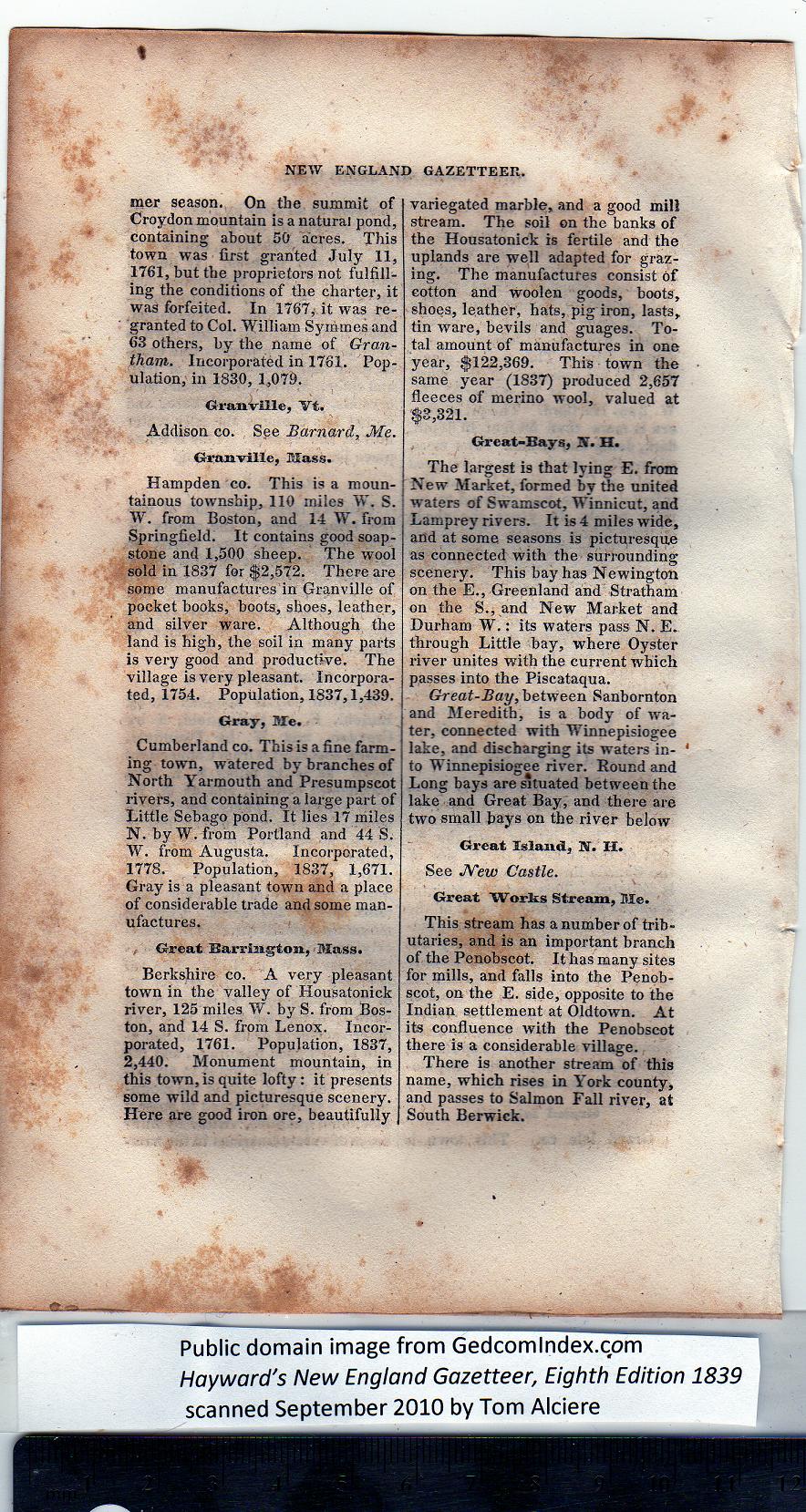|
mer season. On the summit of ;
Croydon mountain is a natural pond,
containing about 50 acres. This
town was first granted July 11,
1761, but the proprietors not fulfill-
ing the conditions of the charter, it
was forfeited. In 1767, it was re-
granted to Col. William Syirimes and
63 others, by the name of Gran-
tham. Incorporated in 1761. Pop-
ulation, in 1830, 1,079.
Granville, Vt.
Addison co. See Barnard, Me.
Granville, Mass.
Hampden co. This is a moun-
tainous township, 110 miles W. S.
W. from Boston, and 14 W. from
Springfield. It contains good soap-
stone and 1,500 sheep. The wool
sold in 1837 for $2,572. There are
some manufactures in Granville of
pocket books, boots, shoes, leather,
and silver ware. Although the
land is high, the soil in many parts
is very good and productive. The
village is very pleasant. Incorpora-
ted, 1754. Population, 1837,1,439.
Gray, Me.
Cumberland co. This is a fine farm-
ing town, watered by branches of
North Yarmouth and Presumpscot
rivers, and containing a large part of
Little Sebago pond. It lies 17 miles
N. by W. from Portland and 44 S.
W. from Augusta. Incorporated,
1778. Population, 1837, 1,671.
Gray is a pleasant town and a place
of considerable trade and some man-
ufactures.
Great Barrington, Mass.
Berkshire co. A very pleasant
town in the valley of Housatonick
river, 125 miles W. by S. from Bos-
ton, and 14 S. from Lenox. Incor-
porated, 1761. Population, 1837, |
2,440. Monument mountain, in
this town, is quite lofty: it presents
some wild and picturesque scenery.
Here are good iron ore, beautifully
variegated marble, and a good mill
stream. The soil on the banks of
the Housatonick is fertile and the
uplands are well adapted for graz-
ing. The manufactures consist Of
cotton and woolen goods, boots,
shoes, leather, hats, pig iron, lasts,
tin ware, bevils and guages. To-
tal amount of manufactures in one
year, $122,369. This town the
same year (1837) produced 2,657
fleeces of merino wool, valued at
$3,321.
Great-Bays, N. H.
The largest is that lying E. from
New Market, formed by the united
waters of Swamseot, Winnicut, and
Lamprey rivers. It is 4 miles wide,
and at some seasons 13 picturesque
as connected with the surrounding
scenery. This hay has Newington
on the E., Greenland and Stratham
on the S., and New Market and
Durham W.: its waters pass N. E.
through Little hay, where Oyster
river unites with the current which
passes into the Piscataqua.
Great-Bay, between Sanbornton
and Meredith, is a body of wa-
ter, connected with Winnepisiogee
lake, and discharging its waters in- *
to Winnepisiogee river. Round and
Long bays are situated between the
lake and Great Bay, and there are
two small hays on the river below
Great Island, N. II.
See JYew Castle.
Great Works Stream, Me.
This stream has a number of trib-
utaries, and is an important branch
of the Penobscot. It has many sites
for mills, and falls into the Penob-
scot, on the E. side, opposite to the
Indian settlement at Oldtown. At
its confluence with the Penobscot
there is a considerable village.
There is another stream of this
name, which rises in York county,
and passes to Salmon Fall river, at
South Berwick. |
